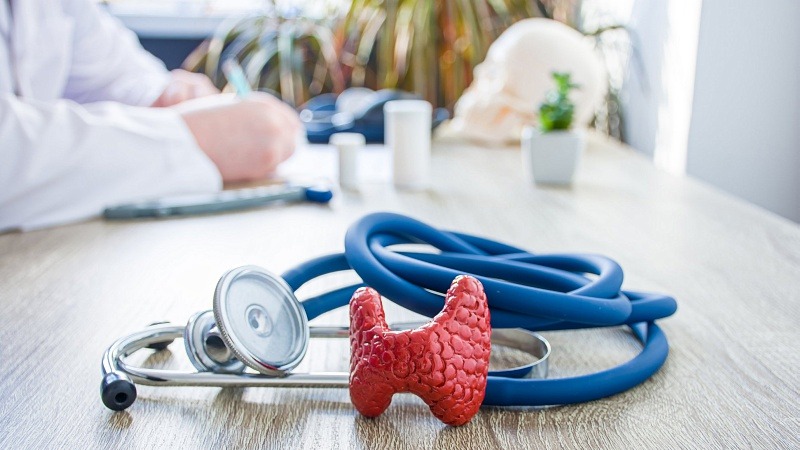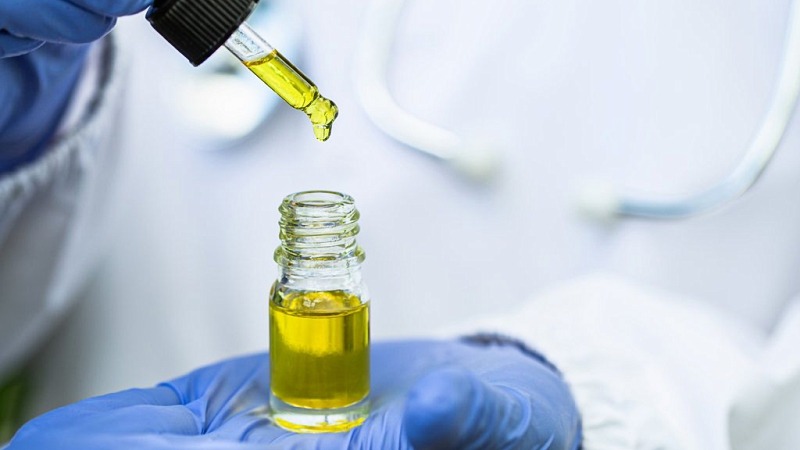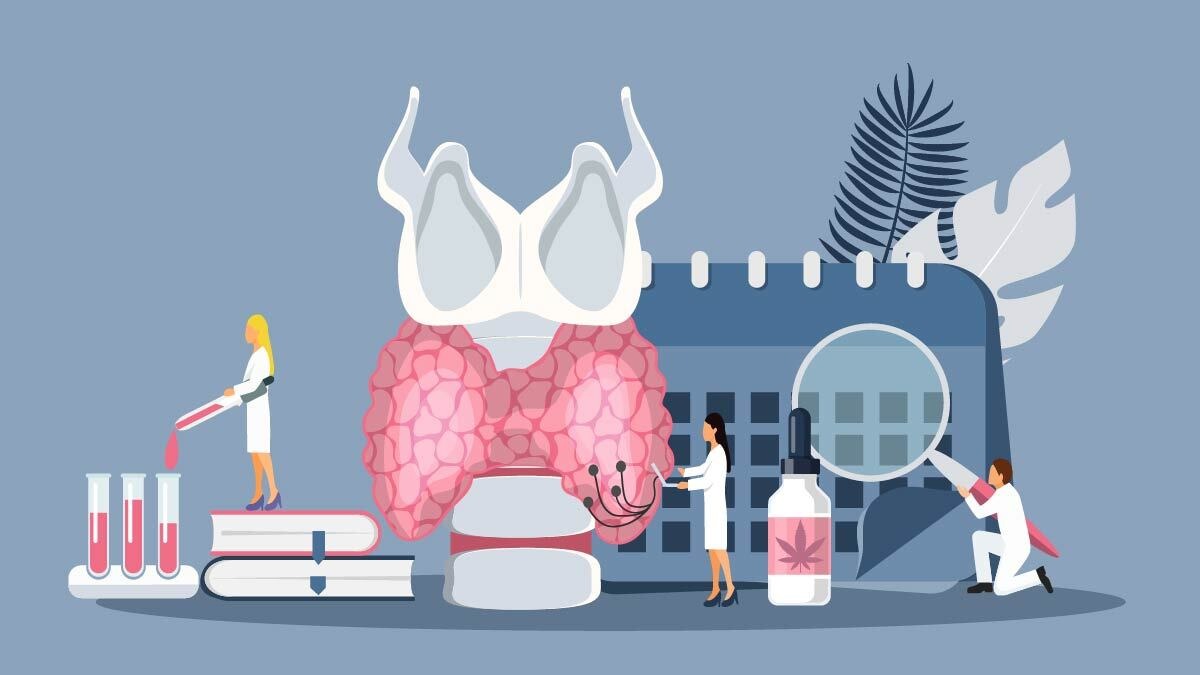The American Thyroid Association (ATA) estimates that over 20 million Americans suffer from some form of thyroid disease.
The thyroid is responsible for producing a variety of hormones that influence several bodily functions. When the thyroid becomes overactive (produces too many hormones) or underactive (produces too few hormones), a range of undesirable symptoms can occur.
CBD may help curb some of these symptoms and may even improve overall thyroid health.
This article will look at CBD’s interaction with the endocannabinoid system and how it may help thyroid-related issues.
What is the Thyroid?
The thyroid is a small gland located at the front of the neck. It sits just below Adam’s apple and is shaped like a butterfly.
The thyroid is responsible for producing hormones T3 and T4 (triiodothyronine and thyroxine). These hormones affect all aspects of the metabolism and influence vital bodily functions such as core temperature, blood pressure, and heart rate.
When the thyroid isn’t functioning as it should, it can produce too few or too many T3 and T4 hormones. Imbalances in these hormones can lead to a range of health problems.
Hypothyroidism is when the thyroid is underactive. An underactive thyroid doesn’t produce enough hormones.
Hyperthyroidism is when the thyroid is overactive. An overactive thyroid produces too many hormones.
Both types of thyroidism can severely affect overall health. However, an overactive thyroid shows different symptoms to an underactive thyroid.
So, what are the symptoms of hypothyroidism and hyperthyroidism?
1. Symptoms of Hypothyroidism (Underactive Thyroid)
There are several symptoms of hypothyroidism. Most early symptoms are relatively mild. However, if left untreated, symptoms can gradually get more severe.
Recognizing the early symptoms will enable you to seek the appropriate treatment and prevent the condition’s progression.
Early Symptoms of Hypothyroidism
- Fatigue
- Weight gain
- Constipation
- Sensitivity to the cold
- Sadness & depression
- Muscle aches & pains
- A feeling of weakness in the muscles & joints
- Muscle cramps
- Headaches
- Difficulty working under pressure
- Loss of sex drive (libido)
- Numbness & tingling in the hands, fingers, & feet
- Brittle hair & nails
- Dry skin & chapped lips
- Irregular periods
Progressive Symptoms of Hypothyroidism
- Slower heart rate
- Low blood pressure
- Thinned facial & body hair
- Loss of hearing
- Memory problems
- Low-pitched & raspy voice
- Puffy face & eyes
- Anemia
2. Symptoms of Hyperthyroidism (Overactive Thyroid)
Like hypothyroidism, hyperthyroidism has several symptoms that usually start mild but can become more severe if the condition is left to progress.
It’s important to address the symptoms early to slow or prevent the progression of the condition.
Early Symptoms of Hyperthyroidism
- Increased heart rate
- Raised blood pressure
- Heart palpitations
- Difficulty sleeping
- Sensitivity to heat
- Mood swings
- Fatigue
- Headaches
- Muscle weakness & tiredness
- Irritability
- Nervousness & anxiety
- Swelling in the neck (enlarged thyroid)
- Twitching, trembling, & muscle spasms
- Weight loss
Progressive Symptoms of Hyperthyroidism
- Dangerously high heart rate
- Increased blood pressure
- Eye irritation & bulging eyes
- Issues with eyesight
- Pregnancy complications (premature birth, miscarriage, or pre-eclampsia)
What are the Causes of Hypothyroidism?

There are several reasons a person may experience hypothyroidism. The most common cause is an autoimmune disease. However, several other factors can cause the onset of hypothyroidism.
Below are some of the major causes of an underactive thyroid, from most common to least common.
1. Autoimmune Disease
As we mentioned, autoimmune disease is the main cause of hypothyroidism. In people with autoimmune diseases, the immune system that usually protects the body from foreign invaders can attack the thyroid.
When the immune system attacks the thyroid, the cells that create both the T3 and T4 hormones can degrade. When there aren’t enough hormone-producing cells in the thyroid, the thyroid becomes underactive — leading to the symptoms listed above.
2. Surgical Removal of the Thyroid
People with thyroid cancer or Grave’s disease may have to undergo a surgical procedure to eradicate the thyroid.
When the thyroid is removed entirely, the body ceases to produce T3 and T4 hormones.
If part of the thyroid gland is left behind, the body may still produce these hormones. However, likely, it won’t produce enough to keep blood levels normal — hypothyroidism.
3. Radiation Treatment
People with thyroid cancer may need to undergo radiation treatment to destroy the cancer cells. During this treatment, the thyroid gland is usually destroyed alongside cancerous cells.
Other diseases require treatment with radioactive iodine, such as lymphoma, Hodgkin’s disease, and head and neck cancers. People who undergo radiotherapy to treat these diseases may lose some or all of their thyroid function.
4. Congenital Hypothyroidism
Congenital hypothyroidism is relatively rare but not unheard of. It’s where people are born without a thyroid entirely, only part of the thyroid gland, or a dysfunctional thyroid.
Babies born with congenital hypothyroidism may not produce enough or any T3 or T4 hormones.
5. Certain Medications
Certain medications such as lithium, interferon-alpha, and amiodarone can cause hypothyroidism.
They can disrupt or halt the function of the thyroid completely as a side effect. However, this side effect is most commonly experienced in people with genetic autoimmune diseases.
What are the Causes of Hyperthyroidism?
As with hypothyroidism, there are several causes of hyperthyroidism. We have listed the major causes below from most common to least common.
1. Grave’s Disease
Grave’s disease is the number one cause of hyperthyroidism. It’s an autoimmune disorder where the immune system mistakenly attacks your thyroid gland.
As a response, the thyroid can become overactive and produce too many hormones. This disease is usually genetic, but it can affect people without a genetic predisposition. Smokers may be at higher risk of developing Grave’s disease.
2. Overactive Thyroid Nodules
Some people may develop thyroid nodules. These small lumps are usually benign (non-cancerous), but they can disrupt thyroid gland function.
People who develop many thyroid nodules can develop hyperthyroidism as a result.
3. Thyroiditis
The inflammation of the thyroid is known as thyroiditis.
Thyroiditis can cause stored thyroid hormones to leak from the thyroid gland and into the bloodstream unnecessarily. The mass excretion of thyroid hormones is usually followed by hypothyroidism as a result.
Thyroiditis usually lasts for one to 3 months but can last longer in some people.
There are three main types of thyroiditis — subacute thyroiditis, postpartum thyroiditis, and silent thyroiditis.
- Subacute thyroiditis usually occurs as a result of a virus or infection. The thyroid becomes enlarged and painful, with hyperthyroidism the following suit.
- Postpartum thyroiditis is apparent only in women. It occurs after a woman gives birth within the first year as a parent. It can last for several weeks to several months.
- Silent thyroiditis is completely painless. It’s called “silent” because of this factor. Although painless, the thyroid becomes inflamed and may produce too many T3 and T4 hormones. The condition is usually the result of an autoimmune disease.
CBD and Thyroid Health

Some studies suggest CBD benefits thyroid health and may help regulate the production of thyroid hormones.
Although research is relatively limited, there’s growing evidence to support CBD’s potential in treating thyroid-related disorders.
CBD’s interaction with the endocannabinoid system may influence thyroid health. The endocannabinoid system is made up of CB1 and CB2 receptors that are present around the body. When these receptors are activated, they can influence several bodily functions.
One 2015 study discovered that both CB1 and CB2 cannabinoid receptors could influence the formation of both benign and malignant tumors in the thyroid. This could potentially prevent the development of hypothyroidism and hyperthyroidism.
For this reason, CBD may also prevent some of the diseases that can cause hypothyroidism and hyperthyroidism.
CBD may also have anti-inflammatory qualities, as some studies suggest. A reduction in inflammation may help combat thyroiditis — reducing hyperthyroidism as a result.
Several other potential benefits that CBD boasts may also help manage the symptoms of both hypothyroidism and hyperthyroidism. Several studies have discovered that CBD may help combat anxiety, depression, chronic pain and regulate body temperature.
Although these factors may not help fix problems with the thyroid, reducing symptoms can improve the quality of life of someone with thyroid issues.
The Effect of CBD Oil on the Thyroid
1. Does CBD Oil Help With Inflammation in the Thyroid?
Hyperthyroidism and hypothyroidism can be triggered by inflammation of the thyroid gland. An autoimmune response usually triggers inflammation.
According to some studies, CBD may help suppress an overactive immune system and reduce certain immune responses. For this reason alone, cannabidiol could help prevent inflammation of the thyroid at the source.
CBD also has anti-inflammatory qualities. Many studies have discovered that CBD’s interaction with the endocannabinoid system (ECS) may reduce inflammation and chronic pain.
Although studies into CBD’s effects on thyroid inflammation are limited, there’s plenty of evidence that backs up the cannabinoid’s potential as an anti-inflammatory and autoimmune treatment.
2. Does CBD Help with Thyroid-related Headaches?
When thyroid hormone levels fluctuate, one of the most common symptoms to experience is headaches.
Thyroid headaches can occur in people with both hypothyroidism and hyperthyroidism. This can come from raised or lowered blood pressure, an increase or decrease in heart rate, or rapid changes in body temperature.
CBD may help ease thyroid headaches by regulating some of the causes. For instance, one study discovered that CBD might help regulate blood pressure and heart rate.
Something as simple as regulating blood pressure may be enough to prevent thyroid-related headaches.
Other studies have looked into the effects of CBD for regulating body temperature through interactions with the hypothalamus with promising results.
Although there is little research into CBD’s effect on thyroid headaches, there’s plenty of evidence that suggests it’s effective at controlling some of the causes of thyroid-related headaches.
3. Does CBD Help with Thyroid Cancer?
There’s limited research that suggests CBD is an effective treatment for thyroid cancer. However, although studies are limited, some research suggests CBD may help with certain cancers.
Studies suggest that CBD may help reduce cancerous tumor size, prevent the mitigation of cancerous cells, and enhance the effects of anti-cancer treatments.
Although research is limited, there is much to say about CBD’s potential as a cancer treatment. This should be taken with a pinch of salt until further research has been done.
Regardless of whether CBD has anti-cancer benefits, several studies show that CBD may help reduce cancer and cancer treatment-related symptoms.
The pain-relieving, anti-inflammatory, and anti-anxiety qualities of CBD may help improve the quality of life of a person with thyroid cancer.
How to Use CBD for Thyroid Health

Research suggests that CBD may improve thyroid health and aid people experiencing hyperthyroidism and hypothyroidism.
CBD may help combat thyroid problems at the core and treat symptoms to improve the quality of life in people with thyroid health problems.
So, how can you use CBD for thyroid health?
1. Selecting the Type of CBD for Thyroid
It’s widely believed that CBD is far more effective and efficient when used alongside the other cannabinoids naturally present in the hemp plant.
This is due to a phenomenon called the entourage effect.
When CBD is used in a full-spectrum extract that contains several different cannabinoids and terpenes from the hemp plant, it’s far more effective at treating a wider range of health conditions.
For this reason, full-spectrum CBD that includes all the naturally present cannabinoids and terpenes present in hemp is considered the most effective for thyroid health. However, some people may not be able to consume THC or some of the other cannabinoids present.
So, what’s the difference between the three types of CBD extract?
Full-spectrum CBD contains cannabidiol and all cannabinoids and terpenes present in raw hemp — including tetrahydrocannabinol (THC) in levels below 0.3%.
Full-spectrum extracts are considered the most valuable at treating a wide range of health conditions. However, the trace levels of THC may show up on drug tests.
Broad-spectrum CBD contains cannabidiol and all of the other cannabinoids and terpenes present in hemp without the THC.
Broad-spectrum extracts are perfect for people who cannot consume THC due to a negative reaction or regular drug screening.
CBD isolate is a pure extract of cannabidiol and contains no other naturally present cannabinoids and terpenes.
CBD isolate is perfect for people that cannot consume any other cannabinoids due to poor reactions. However, they’re considered the least valuable in terms of health benefits as no level of the entourage effect occurs.
2. Selecting the Best CBD Product for Thyroid
Selecting the best CBD product for thyroid health ultimately comes down to your personal preferences.
If you prefer to consume a simple pill, CBD capsules are best. If you would like to consume CBD in a food format, gummy edibles are a nice treat. If you are looking for ultimate flexibility over your dose and potency, you can’t go wrong with CBD oil.
If you’ve never used CBD before, the best way to consume CBD for thyroid health is by using CBD oil.
With CBD oil, you can adjust the dose by simply altering the amount you drop under the tongue. CBD oil is also the most bioavailable way to consume CBD orally as it’s sublingually absorbed rather than passed through the digestive tract.
This means it works faster, for longer, and more efficiently than CBD edibles and CBD capsules.
3. What’s the Right CBD Dosage for Thyroid?
CBD works differently from person to person.
One person may need less CBD than another. This could be down to many factors such as metabolism, body weight, age, and gender.
When you first use CBD for thyroid health, it’s important to start with a low dose and increase it slowly over time. This way, you can find your optimum dose effectively without wasting the product or experiencing any negative effects.
When you first use CBD for thyroid health, you should start with a dose of 5 mg per 10 pounds of body weight. If no noticeable effects are seen, you can increase the dose in 1 to 2 mg increments every two days until the desired effects are noticed.
CBD and Thyroid Medication
CBD can react with certain medications, making them less effective. CBD interacts with the cytochrome p450 system. The p450 is a group of enzymes that are responsible for breaking down and metabolizing medications.
When these enzymes don’t effectively break down the ingredients in certain medications, the medication might stop working, and a build-up of toxic substances may occur.
Although this isn’t the case with all medications, it’s wise to consult your doctor before using CBD alongside any thyroid meds you may be taking.
Is It Safe to Use CBD with Levothyroxine?
As we discussed above, CBD can inhibit the body’s ability to metabolize certain ingredients in medications.
There’s not much scientific research into CBD’s effects on levothyroxine (a common thyroid medication). However, many people do consume CBD alongside it. It’s important to consult your doctor before taking CBD with levothyroxine.
Most people report no negative side effects when the cannabinoid is consumed while levothyroxine is in the system.
The safest way to consume CBD while taking any over-the-counter or prescription meds is to leave a 2-hour gap between taking CBD and the medication in question. This allows your liver time to break down the compounds in both substances.
Final Thoughts: Does CBD Work for Thyroid-Related Conditions?
CBD has the potential to relieve pain and inflammation in the thyroid. It may be a good natural alternative for treating thyroid-related issues. However, CBD works differently with everyone and may impact the effectiveness of certain thyroid medications.
With this in mind, it’s important to always consult your doctor or a specialist before consuming CBD for thyroid.
Although research is still in its early days, there’s plenty of evidence that suggests CBD may help regulate certain bodily functions and reduce thyroid-related symptoms.
Supplementing your diet with CBD and implementing certain lifestyle changes may impact thyroid health for the better.
References Used In This Article
- Lakiotaki, E., Giaginis, C., Tolia, M., Alexandrou, P., Delladetsima, I., Giannopoulou, I., … & Theocharis, S. (2015). Clinical significance of cannabinoid receptors CB1 and CB2 expression in human malignant and benign thyroid lesions. BioMed research international, 2015. [1]
- Atalay, S., Jarocka-Karpowicz, I., & Skrzydlewska, E. (2020). Antioxidative and anti-inflammatory properties of cannabidiol. Antioxidants, 9(1), 21. [2]
- Nichols, J. M., & Kaplan, B. L. (2020). Immune responses are regulated by cannabidiol. Cannabis and cannabinoid research, 5(1), 12-31. [3]
- Xiong, W., Cui, T., Cheng, K., Yang, F., Chen, S. R., Willenbring, D., … & Zhang, L. (2012). Cannabinoids suppress inflammatory and neuropathic pain by targeting α3 glycine receptors. Journal of Experimental Medicine, 209(6), 1121-1134.
- Jadoon, K. A., Tan, G. D., & O’Sullivan, S. E. (2017). A single dose of cannabidiol reduces blood pressure in healthy volunteers in a randomized crossover study. JCI insight, 2(12).
- Wenger, T., & Moldrich, G. (2002). The role of endocannabinoids in the hypothalamic regulation of visceral function. Prostaglandins, Leukotrienes and Essential Fatty Acids (PLEFA), 66(2-3), 301-307. [4]
- Go, Y. Y., Kim, S. R., Chae, S. W., & Song, J. J. (2020). Cannabidiol enhances cytotoxicity of anti-cancer drugs in human head and neck squamous cell carcinoma. Scientific Reports, 10(1), 1-11. [5]
- Russo, E. B. (2019). The case for the entourage effect and conventional breeding of clinical cannabis: no “strain,” no gain. Frontiers in plant science, 9, 1969.[6]
- Zendulka, O., Dovrtelová, G., Nosková, K., Turjap, M., Sulcová, A., Hanus, L., & Jurica, J. (2016). Cannabinoids and cytochrome P450 interactions. Current drug metabolism, 17(3), 206-226. [7]

